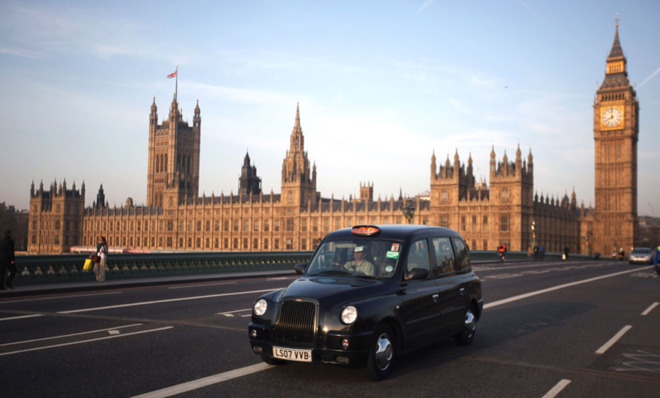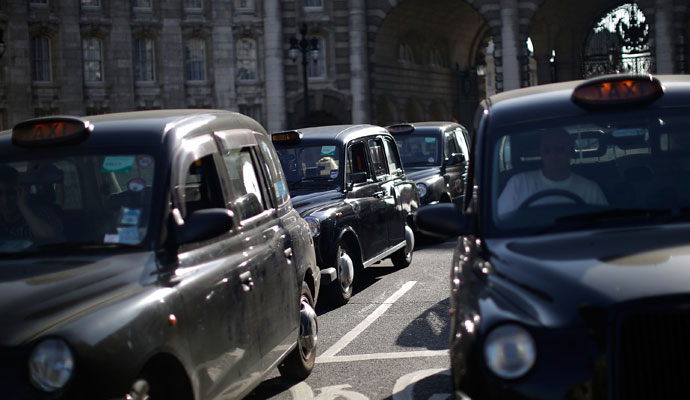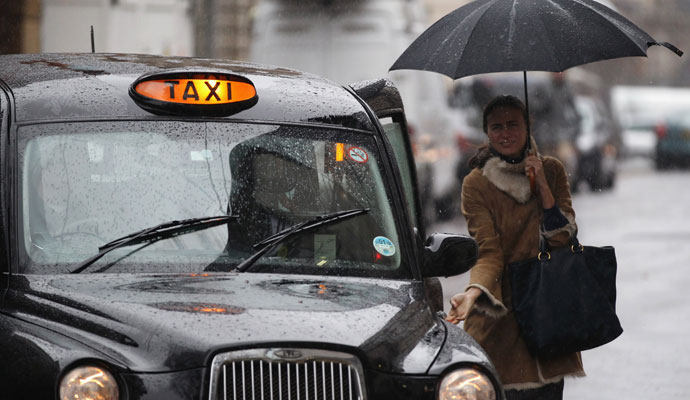London cabbies: The masters of memory
To be a London cabbie, you have to know 25,000 streets better than a GPS

A free daily email with the biggest news stories of the day – and the best features from TheWeek.com
You are now subscribed
Your newsletter sign-up was successful
STEVE SCOTLAND HAD better reason than most for thinking he knew London like the back of his hand. Not only was he a native Londoner, born and bred, but he'd spent years working as a chauffeur in the city, driving his passengers wherever they wanted to go, finding the shortcuts, negotiating the city's traffic-clogged streets swiftly, accurately, and with a minimum of fuss.
So he quietly fancied his chances of passing "The Knowledge" test — the demanding test of London's back streets and landmarks that confronts anyone who wishes to join the elite ranks of London's cabdrivers.
Although "Knowledge Schools" exist to offer advice and help would-be cabbies prep for the series of examinations they have to pass along the way, the intensive learning of the city's streets and landmarks, through thousands of miles of exploration by scooter or on foot, is very much a do-it-yourself affair, all of it on your own time and at your own pace.
The Week
Escape your echo chamber. Get the facts behind the news, plus analysis from multiple perspectives.

Sign up for The Week's Free Newsletters
From our morning news briefing to a weekly Good News Newsletter, get the best of The Week delivered directly to your inbox.
From our morning news briefing to a weekly Good News Newsletter, get the best of The Week delivered directly to your inbox.
Nearly five years later, and with more than 10,000 miles clocked on his scooter, Scotland is still at it — though the end is in sight. A good enough score on his next test, and he'll have done it — cracked The Knowledge and earned himself the coveted green-and-white badge of a London cabbie.
"I had no idea how tough this would be," he says. "I really thought I knew the city well, but what I knew, or thought I knew, was nothing compared with what it takes to do The Knowledge."
FORGET MENSA AND armchair brainteasers. The Knowledge of London is a real-time, street-level test of memorization skills so intense that it physically alters the brains of those who pass it.
To qualify for that elusive green badge, you need to learn by heart all 320 sample runs that are listed in the Blue Book, the would-be cabbie's bible. You will also have to commit to memory the 25,000 streets, roads, avenues, courts, lanes, crescents, places, mews, yards, hills, and alleys that lie within a six-mile radius of Charing Cross.
A free daily email with the biggest news stories of the day – and the best features from TheWeek.com
Add to that the locations of another 20,000 landmarks and points of interest — pubs, clubs, museums, parks, monuments, railway stations, Tube stations, hospitals, schools, police stations, government buildings, embassies, cemeteries, churches, guild halls, theaters, cinemas — any place, in other words, a fare-paying passenger might conceivably ask to be taken or an examiner might challenge you to find.
You'll need to know your way around so well that, when asked, you can calculate the most direct legal route between any two addresses anywhere in the entire 113-square-mile metropolitan area within seconds, without looking at a map, and be able to rattle off the precise sequence of streets, junctions, roundabouts, and left- and right-hand turns necessary to complete such a journey.
And you'll have to be able to do this consistently, not just once or twice, but in a potentially endless series of one-on-one oral exams, called "appearances," taken at regular intervals until the examiners are satisfied that you do indeed possess The Knowledge.

EVEN IN THIS time of GPS and Google Maps, satellite navigation is no match for a cabbie with The Knowledge. In May, London's Guardian newspaper pitted a cabbie against a Sat Nav–equipped driver from Uber, the new "taxi" company that allows passengers to book cars via their smartphones. The Uber driver did the run from the newspaper's office in King's Cross to Big Ben, in Westminster, in 22 minutes; the cabbie did it in 18, by taking a slightly longer route he knew to be quicker.
Such victories are points of pride these days within the ranks of London's cabbies, who have launched legal challenges against the upstart Uber. Proponents of Uber say Sat Nav technology makes The Knowledge obsolete. Not surprisingly, London's cabbies disagree. They're quick to point out that Sat Navs have a knack for getting things wrong and do not always pick the best or quickest route, and that having thousands of cabs idling curbside while their drivers punch in addresses for their Sat Navs will further clog London's streets, where average speeds have already dropped below 9 miles per hour.
It's not simply a matter of speed, either, cabbies say. A driver who relies on Sat Nav doesn't know the city. "I like to put it this way," says 18-year veteran David Styles, who writes a blog about life behind the wheel: "When gentlemen have enjoyed supper at their club with their old regimental chums, they often need a taxi to take them to Victoria station. Depending on which entrance they want, they'll use [slang for drop-offs like] the Shakespeare, Old Gatwick, or Hole in the Wall. Show me a Sat Nav which not only has that database but can be programmed in seconds, and I'll buy shares in it myself."
For more than 150 years, London cabbies have been required to be the consummate experts on their city. The whip-cracking drivers of those Victorian hansom cabs Sherlock Holmes was forever hailing all had to bone up for the world's toughest geography test, just as the roughly 25,000 drivers of London's cabs must today.
The final series of tests, known as the "required standard," or "req" for short, is known among cabbies as the Nervous Wreck. Here's where the last-minute jitters creep in.
Indeed, Steve Scotland would have had his badge a few weeks ago, at his last appearance, had he not miscued a turn and dropped his hypothetical passenger off on the wrong side of the street. "Just nerves," he recalls.
As a result, instead of spending this Sunday afternoon sitting home watching soccer, he's once more astride his scooter, still a "Knowledge Boy," puttering around London's financial district, brushing up for his next — and hopefully final — appearance.
"A new restaurant has opened up around here, and I want to get it fixed in my mind — just in case," he says. "You just never know what the examiners are going to ask you."
CABBIES COME FROM all walks of life — students, tradesmen, lawyers, teachers. Most grew up in or around London, but people from elsewhere in Britain, and even a few foreigners, have successfully completed The Knowledge.
"I was studying biology," says 24-year-old Osman Jamal Zai, who left school six months ago and began studying The Knowledge. "This just seemed like a better idea, and I have to say I'm loving it."
By all accounts, being a London cabbie pays well. Although the cabbies themselves are cagey about what they earn, it's widely accepted that incomes of $100,000 a year aren't unusual, with some operators — those working extremely long hours — believed to be making as much as $170,000.
Aside from the money, the draw for many is the ability to set their own hours and achieve an enviable work-life balance. And unlike many cities — Paris, for instance, which imposes strict limits on the numbers of cabs — London is wide open. Anyone of good character can get a cabdriver's license, as long as he or she passes The Knowledge.
While a fortunate few — those who can afford to pursue the training full time — can complete it in as little as two years, most have to fit The Knowledge in around work and family commitments. "I'm guessing it'll take me around five years," says 53-year-old David Greenhalgh, an IT specialist who's spent the past two years juggling street explorations and his day job.
Only about one in five of those who attempt The Knowledge ever makes the grade. "You can never actually fail," Styles says. "There's only quitting. You're allowed to keep trying as long as you like." The overwhelming majority drop out in frustration after a year or so.
To put the success rate into perspective, the percentage of people who successfully complete The Knowledge is roughly the same as that of candidates who make it through the training to become a U.S. Navy SEAL.
"There are no shortcuts," says 79-year-old cabbie Alf Townsend, who did The Knowledge in 1962 and still drives his cab a few hours a day to mingle with old friends and keep his hand in. "You can't do it by sitting at home, memorizing maps and street names, and hope to pass that way. You have to get out on the streets, putting in the miles, seeing and experiencing everything firsthand. There's no other way."
To master a route for testing purposes, a student not only has to memorize the streets linking the two points but also needs to be intimately familiar with the back streets and landmarks within a quarter-mile radius around those points.

Initial enthusiasm soon wanes in the face of the mind-boggling complexity of London's labyrinthine streets and the sheer frustration in trying to learn them all.
"There comes a time, about a year into it, when you really begin to doubt what you're doing," says Robert Lordan, a 33-year-old former schoolteacher who, like Styles, writes a blog on cabbie life. Eventually though, with persistence, he says, there comes a tipping point, when it all starts to make sense. "It's like putting together a jigsaw puzzle. Suddenly you see it. You spend so much time on the streets and studying the map at home that it etches itself on your brain."
After the 320 runs are memorized, The Knowledge student begins the long battery of oral tests. The first are called 56-day appearances, given every eight weeks. "The examiner asks you to do four runs," says Greenhalgh, who's made it through two 56-day appearances thus far. "Each run is worth 10 points. If you get a perfect score of 40 — something phenomenally rare — you get an A and advance straight to the next level, your 28-day appearances."
Lesser scores are awarded B or C or D grades, and the student returns in 56 days to try again. Grading is strict. Points are deducted for "hesitancy," and making an illegal turn or going the wrong way on a one-way street earns you a big fat zero. To advance to the next level of testing, a candidate needs the equivalent of two B's or four C's.
If after seven attempts you've not scored well enough to move on to your 28-day appearances, the slate is wiped clean, and you start the 56-day tests all over again. This setback happens to as many as 80 percent of first-time Knowledge students.
When you get to your 28s, the exams come every four weeks and proceed along exactly the same lines as the 56-day ones, only now the questions are even more demanding. If you fail to advance after seven appearances, you go back and start your 28s again. Fail twice, and you go back to your 56-day appearances.
Eventually, if you persist, you reach your 21-day appearances — the final tier. Scoring here is just the same, with the same number of tests, only now the questions and expectations are tougher still.
"It's a very emotional moment when you realize you've done it and get that handshake from the examiner," says Lordan, who passed four-and-a-half years ago. "I know I got quite teary. They tell me a lot of guys cry when they get their badge. You've invested so much of yourself, your time and your life, into doing this, to reach the end is just incredible."
"Doing The Knowledge has made me somewhat obsessive," Lordan laughs. "I'm constantly striving to improve my grasp of the city, to learn as much as I can. I love this job. I'm always learning something new. As Samuel Johnson said, a man who's tired of London is tired of life."
Excerpted from an article that originally appeared at National Geographic. Reprinted with permission.
-
 American universities are losing ground to their foreign counterparts
American universities are losing ground to their foreign counterpartsThe Explainer While Harvard is still near the top, other colleges have slipped
-
 How to navigate dating apps to find ‘the one’
How to navigate dating apps to find ‘the one’The Week Recommends Put an end to endless swiping and make real romantic connections
-
 Elon Musk’s pivot from Mars to the moon
Elon Musk’s pivot from Mars to the moonIn the Spotlight SpaceX shifts focus with IPO approaching